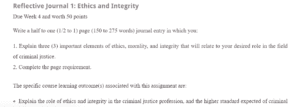Ethics and Integrity
Criminal justice refers to providing justice to offenders or individuals who have committed crimes. Criminal justice is a broad area that touches on a string of government institutions and agencies, such as courts, the police, prisons, probation systems, defense/prosecution lawyers, as well as rehabilitation and correction centers. However, in the process of delivering justice to criminals, some officers (whether attorneys, judges, prison wardens, the police, parole officers, or correctional officers) are often required to follow a certain set code of ethics and integrity to ensure that they act professionally and morally. Usually, ethics and integrity standards are stipulated to try to control errand officers, corrupt officers, or other unethical behavior. For example, correction officers are often required to respect the rights of prisoners by treating all inmates equally, without bias. As a lawyer, I think three vital elements of morality, ethics, and integrity are pertinent to my field.
Do you need an original ethics and integrity essay? Contact us
The first ethical code for lawyers is confidentiality. For attorneys, whether representing offenders or victims, confidentiality or secrecy is a prerequisite. According to Pollock (2019), communications made secretly between lawyers and their clients are subject to ‘legal professional privilege’ and should be confidential, especially if their purpose is to seek legal redress or advice. This means that lawyers cannot expose these secrets to their fellow attorneys or any other third party. However, minutes of meetings, correspondence with opposite attorneys, and notes taken during an open court proceeding do not enjoy this legal professional privilege rule. There are other exceptions to this ethical code. For instance, confidentiality does not extend to affidavits or files that are part of a fraudulent or criminal act or communications that occur with the intent to commit a crime. This implies that a lawyer is culpable if he/she is informed that the deal or transaction they are working on is a transgression. It is also important to note that beyond the lawyer, this rule applies to all employees hired by the lawyer.
Apart from being confidential, lawyers are also required to maintain the highest level of integrity and honesty by maintaining as much professionalism and competence as possible. In law, competent representation of clients demands that lawyers possess adequate skills, knowledge, preparation, and thoroughness that are required to represent a client in a court of law or through a legal proceeding. In addition, attorneys are obliged by law to act promptly and diligently. By being true, lawyers are prohibited from accepting tasks that are beyond their educational level, skills, and competencies. According to Criminal Justice (n.d.), failure to act competently can sometimes lead to the clients filing for ‘ineffective counsel assistance,’ whereby courts are forced to replace particular representatives.
Thirdly, counsels are required to treat the clients they represent with respect and fairly, particularly in a manner that preserves their interests. According to Pollock (2019), fair treatment means that lawyers must act with impartiality, without bias based on personal connections with the client, economic background, sexual orientation, gender, age, religious background, political background, and so on. Lawyers have a right to denounce their representation if they feel that any of these factors might compromise their practice or decision.
Finally, it is critical to note that ethics and integrity in the criminal justice profession play a fundamental role in ensuring the criminal justice system meets the population’s needs. Specifically, ethical standards are imperative in serving both the victim and the accused with balanced justice. These standards also ensure that officers tasked with upholding the rule of law do not overstep their discretion. For example, ethics and integrity ensure that prison officers take advantage of their position to deny inmates rights to healthy food, clean water, healthcare services, and so on. From the above discussion, one higher standard expected of criminal justice professionals is to act with integrity, honesty, and openness.
Other Related Posts: https://eminencepapers.com/him-6320-assignment-4/
References
Criminal Justice. (n.d.). Court ethics. http://criminal-justice.iresearchnet.com/criminal-justice-ethics/court-ethics/
Pollock, J. M. (2019). Ethical dilemmas and decisions in criminal justice (10th ed.). Cengage Learning, Inc.
ORDER A PLAGIARISM-FREE PAPER HERE
We’ll write everything from scratch
Question
Reflective Journal 1: Ethics and Integrity
Due Week 4 and worth 50 points
Write a half to one (1/2 to 1) page (150 to 275 words) journal entry in which you:

Ethics and Integrity
- Explain three (3) important elements of ethics, morality, and integrity that will relate to your desired role in the field of criminal justice.
- Complete the page requirement.
The specific course learning outcome(s) associated with this assignment are:
- Explain the role of ethics and integrity in the criminal justice profession, and the higher standard expected of criminal justice professionals.
- Write clearly and concisely about ethics and leadership in criminal justice using proper writing mechanics.

